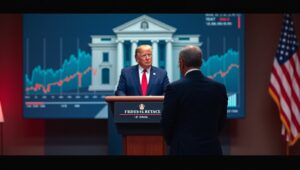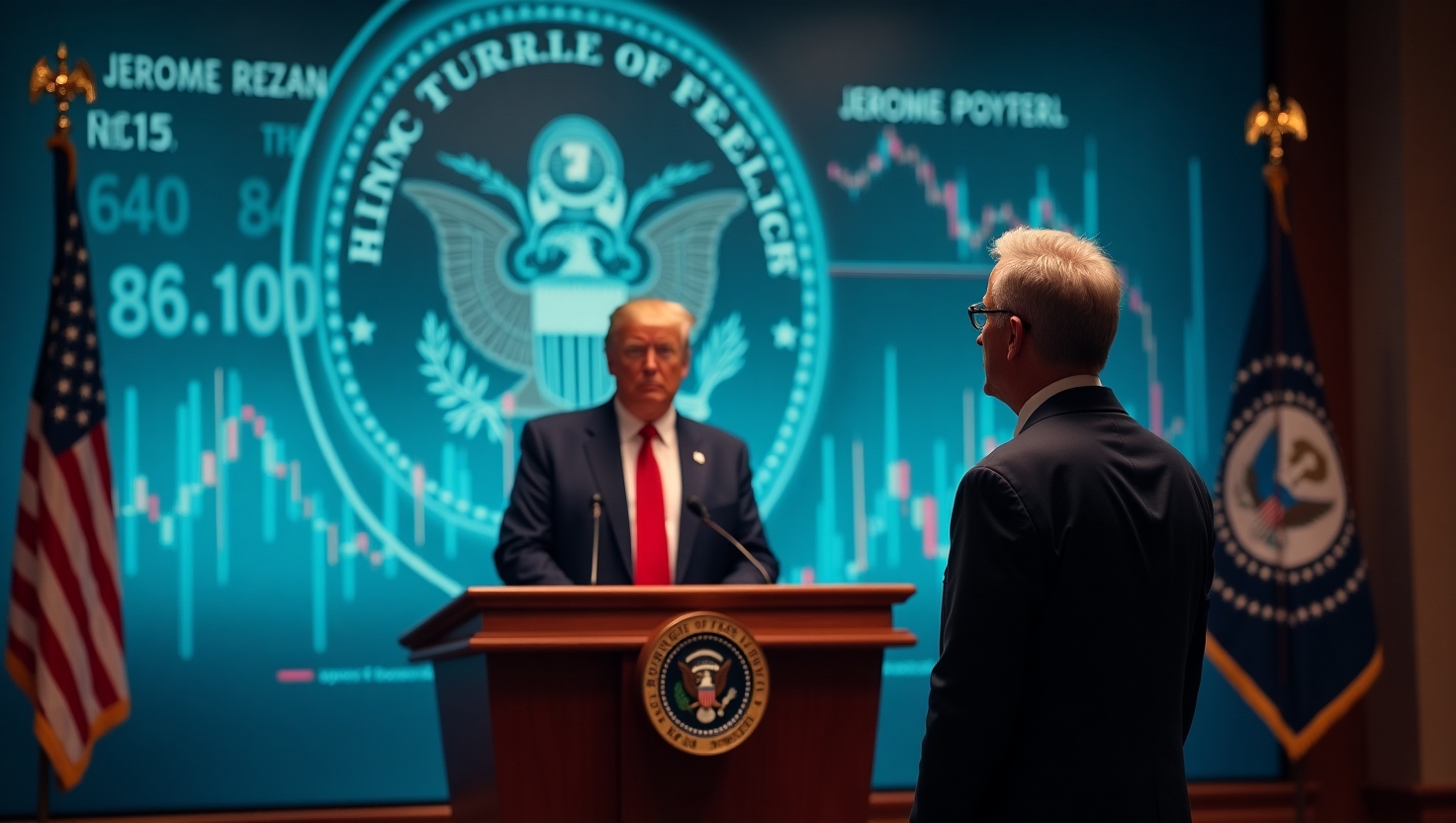Can Trump Fire Jerome Powell? Exploring the President’s Power Over the Federal Reserve
When it comes to the relationship between the U.S. president and the Federal Reserve, one question often arises: Can a president fire the chairman of the Federal Reserve? In this article, we’ll delve into the complex dynamics between President Donald Trump and Jerome Powell, the current chairman of the Federal Reserve. This exploration covers both legal aspects and the broader political implications of such a decision.
Understanding the Federal Reserve and Jerome Powell’s Role
The Federal Reserve, often referred to as the Fed, is the central bank of the United States. It plays a crucial role in regulating the U.S. economy, managing monetary policy, overseeing the banking system, and controlling inflation. The chairman of the Federal Reserve, currently Jerome Powell, is the highest-ranking official at the Fed, responsible for implementing the central bank’s policy decisions.
Jerome Powell was nominated by President Donald Trump in 2017 and confirmed by the Senate in early 2018. As Fed chairman, Powell has navigated several key economic challenges, including the aftermath of the 2008 financial crisis and the economic fallout from the COVID-19 pandemic. However, throughout his tenure, Powell’s decisions have sparked tension between him and President Trump, especially regarding interest rates and monetary policy.
Before we dive into the question of whether Trump can fire Powell, it’s essential to understand the legal framework surrounding the Federal Reserve and its leadership.
The Federal Reserve’s Independence
The Federal Reserve operates as an independent entity within the U.S. government. While it works closely with the president and Congress, it is not under their direct control. This independence is a cornerstone of the Federal Reserve’s structure, designed to prevent political influence from interfering with economic decision-making.

The Federal Reserve Act, which established the Fed in 1913, ensures that its leadership operates with a high degree of autonomy. While the president nominates the chair of the Federal Reserve, the Senate must confirm the appointment. Once confirmed, the chairman serves a four-year term, though they can be reappointed for additional terms.
Can the President Fire Jerome Powell?
While the Federal Reserve operates independently, the president does have the power to remove the chairman from office. However, this power is not absolute, and there are legal limitations.
The Federal Reserve Act does not provide the president with an explicit right to remove the chairman at will. The chairman can only be removed for cause, such as neglect of duty, malfeasance, or failure to meet the qualifications required for the position. This legal provision aims to protect the Fed’s independence from political pressure.
However, it is important to note that the president can replace a chairman at the end of their term. In Powell’s case, his term as chairman is set to expire in 2022, and President Trump could theoretically choose not to nominate him for a second term. If Trump decided not to renominate Powell, he would be replaced by a new chairman, though this decision would require Senate confirmation.
Trump’s Criticism of Jerome Powell
President Trump has been outspoken in his criticism of Jerome Powell during his tenure as Fed chairman. One of the most prominent areas of disagreement has been Powell’s stance on interest rates. In the wake of the 2018 stock market decline, Trump repeatedly urged Powell to lower interest rates to stimulate economic growth. However, Powell maintained that interest rate decisions should be based on economic data and not political pressure.
Trump’s frustration with Powell reached a peak in 2019 when he publicly suggested that Powell should be “removed” or “fired” for not cutting rates as aggressively as Trump desired. Trump’s comments raised the question of whether he had the legal authority to fire the Fed chairman and if such a move would be politically feasible.
Political Consequences of Firing Jerome Powell
Even if President Trump could legally remove Jerome Powell, the political consequences of such an action would be significant. The Federal Reserve’s independence is widely regarded as essential to maintaining confidence in U.S. monetary policy. Any attempt by the president to remove Powell would likely lead to concerns about politicising the Fed, which could undermine trust in the institution.
Such a move would also likely face significant push back from both Democrats and Republicans in Congress, who value the Fed’s independence and may see Trump’s actions as an overreach of executive power. Additionally, a public confrontation between the president and the Federal Reserve could create market uncertainty, which could have negative economic implications.
The Role of the Senate in Confirming a New Chairman
If President Trump decided to replace Jerome Powell as Fed chairman, the nomination of a new chairman would require Senate confirmation. This process could be contentious, as senators from both parties may have concerns about the president’s nominee. The Senate’s role in confirming the Fed chairman helps ensure that the appointment is subject to oversight and does not solely reflect the president’s preferences.
If the Senate rejected Trump’s nominee, it could further complicate the relationship between the executive branch and the Federal Reserve. In some cases, such political battles over the Fed chairmanship can lead to a divided government, which could affect the broader economic landscape.
Jerome Powell’s Reappointment in 2022
As mentioned earlier, Jerome Powell’s term as chairman of the Federal Reserve is set to expire in 2022. If Trump were to win re-election, he could nominate a new chairman or reappoint Powell for another term. However, Powell’s reappointment would require Senate approval, and it is possible that some senators could oppose his nomination, particularly if Trump’s policies clash with the Fed’s independence.
Powell’s potential reappointment has been a subject of debate among economic analysts and political observers. Some believe that Powell has done an excellent job managing the Fed during tumultuous economic times, while others argue that his policies have been too cautious. Ultimately, the decision to reappoint Powell would depend on political dynamics and the state of the economy at the time.
Would Firing Jerome Powell Be Wise?
Even if President Trump could legally remove Jerome Powell, the question remains whether doing so would be wise. Many experts argue that such an action could have serious consequences for the U.S. economy. The Federal Reserve plays a crucial role in managing inflation, stabilising financial markets, and promoting economic growth. Any disruption to its leadership could cause instability in these areas.
Moreover, firing Powell could undermine confidence in the Fed’s ability to make objective, data-driven decisions. This could lead to increased market volatility, rising interest rates, and a loss of investor confidence. The optics of such a move could also harm the president’s political standing, as it could be perceived as an attempt to undermine the Fed’s independence for political gain.
What Would Happen If Trump Fired Jerome Powell?
If President Trump were to go ahead with firing Jerome Powell, the immediate aftermath would likely be a period of uncertainty. Financial markets could react negatively to the news, especially if the president appoints a new chairman who is perceived as more willing to cater to his political preferences. In the worst-case scenario, such a move could trigger a financial crisis, similar to the volatility that followed other instances of political interference with the Fed.
The long-term effects of firing Powell would depend on the president’s ability to install a successor who can effectively manage the economy. If Trump appointed a new chairman who was widely respected for their economic expertise, the effects might be less severe. However, if the president were seen as using the Fed for political purposes, the damage to the institution’s credibility could last for years.
Conclusion: The Balance Between Power and Independence
The question of whether Trump can fire Jerome Powell underscores a broader debate about the balance between presidential power and the independence of institutions like the Federal Reserve. While the president does have the legal authority to remove the Fed chairman under certain circumstances, doing so could have serious political and economic consequences. The Federal Reserve’s independence is crucial to ensuring that U.S. monetary policy is based on sound economic principles, rather than short-term political considerations.
Whether Trump chooses to reappoint Powell or nominate a new chairman in 2022, it is clear that the relationship between the president and the Federal Reserve will remain a subject of intense scrutiny. The question of whether the president can fire Jerome Powell highlights the delicate balance between executive power and the need for an independent central bank.
FAQs
Can the President fire the Chairman of the Federal Reserve? Yes, the president has the authority to remove the chairman of the Federal Reserve, but only for cause, such as neglect of duty or malfeasance.
Why has Trump criticised Jerome Powell? President Trump has criticised Jerome Powell for not cutting interest rates aggressively enough to stimulate economic growth, especially during the trade wars and market volatility of his presidency.
What would happen if Trump fired Powell? If Trump fired Jerome Powell, it could cause instability in the financial markets and undermine confidence in the Federal Reserve’s independence. It could also spark a political battle in the Senate over the appointment of a new chairman.
How long is the term for the Chairman of the Federal Reserve? The term for the chairman of the Federal Reserve is four years, and the chairman can be reappointed for additional terms.
Could Trump nominate a new Chairman of the Federal Reserve? Yes, Trump could nominate a new chairman when Powell’s term expires in 2022, but the nomination would require Senate confirmation.
Why is the Federal Reserve independent? The Federal Reserve is designed to be independent to prevent political interference in monetary policy, ensuring decisions are based on economic data rather than short-term political goals.
Conclusion:
The Federal Reserve’s independence is one of its most important features, and the question of whether President Trump can fire Jerome Powell speaks to the delicate balance between executive power and institutional independence. While the president does have the power to remove Powell under specific circumstances, the political and economic ramifications of such a move would be profound. As we await further developments, the relationship between Trump and the Federal Reserve will undoubtedly continue to shape discussions about economic policy and political influence.
